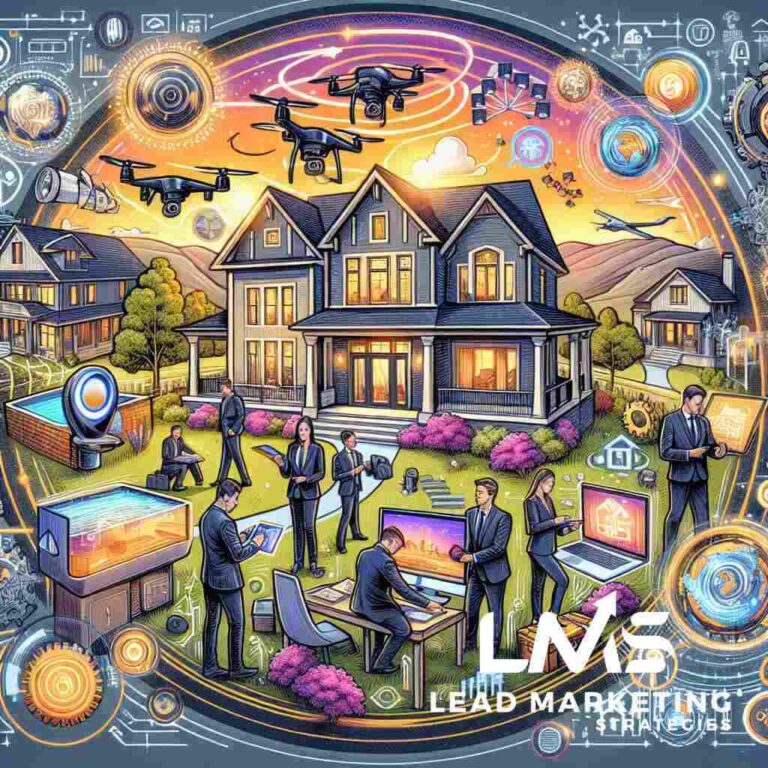Unveiling the Social Media Landscape for Realtors
The Digital Influence: How Social Media Transforms Real Estate
In the constantly evolving landscape of the real estate industry, digital influence has become increasingly paramount. Social media platforms have fundamentally changed how real estate agents connect with potential clients. This transformation isn’t merely about new communication channels-it’s about creating networks and communities around property listings. By leveraging platforms like Instagram, Facebook, and LinkedIn, real estate agents can showcase property sales content, engage with a wider audience, and significantly enhance their digital influence. Ultimately, agents who master social networking have a competitive edge in driving property leads and building long-term client relationships.
Exploring Social Media Platforms for Realtor Success
Understanding which social media platforms drive the most success is crucial for real estate professionals. Each platform offers unique opportunities and challenges. Facebook, for instance, allows for rich engagement through detailed property listings and client testimonials. Meanwhile, platforms like Instagram excel at visually captivating content through real estate photo tours and stories. LinkedIn provides a professional network for establishing connections with other industry experts, which can lead to collaborative opportunities. Moreover, Pinterest, often overlooked, allows for showcasing luxurious and aspirational property designs. As we delve deeper into these platforms, it becomes clear that real estate social media marketing impact is profound, shaping the strategies realtors deploy to secure prospective clients.
The Shift from Traditional to Digital: A Realtor’s Perspective
The shift from traditional to digital marketing in real estate signifies a broader trend in consumer engagement preferences. More prospective buyers begin their search online, relying heavily on social media platforms for initial opinions and ideas. Realtors, recognizing this shift, are increasingly turning to digital tools to enhance their visibility and client reach. This transition involves adopting new strategies, such as Search Engine Optimization (SEO) and engaging in digital marketing for real estate, which are vastly different from traditional print advertising methods. The digital landscape offers GPS-targeting, online reviews, and testimonials, thereby providing richer data about client preferences. For real estate professionals embracing this change, a wealth of opportunities awaits in terms of acquiring quality leads and establishing a strong online brand presence. Those adapting quickly to this digital transformation will undoubtedly lead the way forward in the future of real estate marketing.
Crafting a Powerful Social Media Strategy
Key Components of an Effective Realtor Social Media Strategy
A truly effective realtor social media strategy hinges on a deep understanding of one’s audience and tailoring content to meet their needs. Real estate agents should focus on authentic storytelling, sharing narratives that resonate with prospective buyers and sellers. By integrating property sales content marketing and leveraging real estate social media trends, agents can maximize engagement and increase their online presence. Consistency in posting and interaction is key, as it builds trust and keeps the audience informed. Moreover, utilizing scheduling tools can save time and maintain a steady flow of content. Finally, incorporating a mix of engaging visuals, client testimonials, and community events can create a well-rounded presence that appeals to varied demographics, fostering stronger client relationships.
Engaging Home Buyers: Content that Captivates
Content that captivates and retains attention is crucial for engaging home buyers through social media. Visual storytelling has emerged as a powerful tool, enabling realtors to showcase homes in an inspiring way. Utilizing video innovations in real estate marketing, agents can create virtual tours and highlight the unique features of each property, enticing potential buyers. Additionally, maintaining a blog that discusses local market trends, offers tips for first-time homebuyers, and highlights community events can boost realtor online engagement. Interactive content, such as polls and Q&A sessions on platforms like Instagram or Facebook, not only makes the buying process more engaging but also fosters a sense of community. By focusing on content that informs and inspires, real estate agents can turn passive viewers into active participants in the market.
Harnessing Analytics for Enhanced Social Media Performance
Leveraging analytics is an indispensable part of refining social media strategies for real estate professionals. By analyzing data from social media interactions, realtors can gain insight into what resonates with their audience. These analytics reveal patterns in user engagement, enabling agents to adjust their strategy to better meet client needs. Through platforms such as Facebook Insights and Instagram Analytics, realtors can track key metrics, including reach, impressions, and user demographics. This data enables them to tailor their digital real estate influence and fine-tune campaigns to target specific audience segments effectively. Incorporating tools that offer advanced analytics ensures a nuanced understanding of market dynamics, empowering realtors to make informed decisions. As a result, these insights drive more effective digital advertising strategies in real estate, enhancing both visibility and lead generation.

The Impact of Social Media on Real Estate Lead Generation
Leveraging Social Media for Lead Generation and Client Acquisition
Social media stands at the forefront of modern lead generation and client acquisition for real estate professionals. Platforms like Instagram and Facebook provide robust tools for connecting with prospective clients, transforming casual browsers into serious buyers. These platforms facilitate real-time interactions that enhance client engagement. By posting consistently on social media channels, realtors can expand their reach and visibility, attracting potential leads more effectively than traditional methods. Additionally, understanding the digital influence on realtor strategies equips real estate professionals to optimize their online presence, ensuring a constant flow of interested clients. This strategic online model enables realtors to cultivate lasting relationships, enhancing both immediate and future sales opportunities.
The Role of Influencer Marketing in Real Estate
Influencer marketing, an innovative approach to social media promotion, has found its niche in the real estate industry. Partnering with influencers who have a substantial following can amplify a realtor’s reach, drawing attention to exclusive listings. Influencers often offer authentic, relatable content that can humanize and elevate a real estate brand’s image. As potential homebuyers increasingly seek advice and opinions online, leveraging influencers can establish credibility and trust. By integrating real estate branding enhancement tips, agents can create compelling narratives around their properties, appealing directly to the influencers’ audiences. Ultimately, influencer marketing broadens the spectrum of clientele, tapping into previously inaccessible demographics and enriching a realtor’s market positioning.
Social Media Advertising: A Game Changer for Realtors
Social media advertising has revolutionized the way real estate professionals market property listings. Through precise targeting and budget-friendly options, platforms like Facebook Ads offer tailored campaign strategies that resonate with specific buyer personas. Realtors can utilize demographic information to target ads more effectively, ensuring the most relevant audiences see their property listings. Incorporating SEO into real estate marketing campaigns enhances their effectiveness, increasing visibility and attracting more qualified leads. This form of digital advertising not only broadens reach but also enables real-time performance tracking, allowing agents to pivot strategies as needed quickly. With these advanced tools, social media advertising stands as a pinnacle of contemporary marketing strategies, offering profound impacts on lead generation and brand recognition in the real estate sector.
Building a Realtor’s Brand Through Social Media
Creating an Authentic Online Presence
Establishing an authentic online presence is crucial for real estate agents seeking to succeed in the digital marketplace. Social media platforms provide realtors with the opportunity to showcase their unique personality and professional ethos. By consistently sharing thoughtful insights into the real estate industry and showcasing genuine interactions with clients, agents can cultivate a brand that resonates with authenticity and credibility. Personalized content, such as behind-the-scenes looks at property tours or day-in-the-life stories, adds a human touch that prospective clients appreciate. The importance of branding in real estate cannot be overstated; it creates lasting impressions and fosters trust among potential clients. This strategic online visibility set the stage for potential buyers and sellers to perceive agents as knowledgeable, industry-leading experts.
Cultivating Relationships and Community Engagement
Community engagement through social media enables real estate professionals to nurture meaningful relationships with current and potential clients. Regular interaction on platforms such as Facebook and Instagram allows realtors to engage in conversations about local events or neighborhood highlights, demonstrating their commitment to the communities they serve. Hosting live Q&A sessions or community giveaways online can also foster a sense of communal connection. These efforts amplify digital engagement in real estate, ensuring agents are seen as approachable and invested in the well-being of the areas they cover. Encouraging and responding to client comments strengthens this bond, transforming social interactions into trust-filled relationships.
Enhancing Realtor Reputation and Trust with Social Proof
Social proof is a crucial component in establishing and maintaining a realtor’s reputation in the digital landscape. Potential buyers and sellers often look to online reviews and testimonials as indicators of an agent’s reliability and success. Highlighting past sales and sharing positive client experiences on platforms like LinkedIn and Instagram provides tangible evidence of a realtor’s expertise. Providing real-time updates on successful transactions or featuring client testimonials reinforces the message of credibility and trust. Engaging with these endorsements online, acknowledging client feedback, and showcasing achievements contribute to developing a robust reputation that inspires trust among future clientele. As social influencer marketing in real estate continues to evolve, this type of social validation becomes increasingly invaluable in persuading new clients to choose a particular real estate service.
Leveraging social media to amplify brand authenticity, cultivate community relationships, and enhance reputation through social proof are key strategies for real estate agents. These approaches not only solidify an agent’s role as a community leader but also ensure sustained growth and visibility in a digitally competent world.

Conclusion: Embracing the Future of Real Estate Marketing
Sustaining Growth in a Digital-First World
As the real estate industry continues to evolve, embracing a digital-first strategy is essential for sustaining growth. Realtors can no longer rely solely on traditional methods. By integrating comprehensive real estate marketing services, agents can effectively tap into potential markets and enhance property listing digital marketing. This approach not only increases visibility but also ensures that realtors maintain a competitive edge in a landscape dominated by digital advancements. With the right mix of technology and the strategies offered by Lead Marketing Strategies, professionals can navigate and thrive in this digital transformation.
The Ever-Evolving Social Media Trends in Real Estate
Social media trends are continuously reshaping the way realtors engage with their audience. Staying updated on these changes is crucial for success in the digital realm of real estate influence. From utilizing emerging platforms to understanding shifts in user behavior, real estate agents must adapt to take full advantage of social media opportunities for property agents. By integrating insights into their marketing strategies, realtors can create impactful campaigns that resonate with their audience. This proactive approach also empowers realtors to effectively leverage social media property listings to convert casual viewers into potential clients.
A Call to Action for Realtors: Adapting to Digital Change
The digital revolution beckons realtors to adapt their strategies and embrace innovative marketing solutions. Collaborating with experts, such as Lead Marketing Strategies, can offer invaluable guidance in navigating this complex landscape. By fully utilizing SEO and SEM strategies for real estate and real estate social media marketing, agents can enhance their brand visibility and lead generation efforts. This call to action challenges realtors to step out of their comfort zones and into a realm where digital savvy defines success. Those who adapt will not only survive but thrive, securing their place at the forefront of modern real estate marketing solutions.
Frequently Asked Questions
Question: How does leveraging social media enhance realtor’s social media impact for lead generation?
Answer: Leveraging social media is crucial for boosting realtor social media impact, particularly in lead generation. By utilizing real estate social media marketing, agents can reach a wider audience through engaging content and proactive community participation. Platforms like Instagram and Facebook allow realtors to share vivid property listings and client testimonials, which resonate with potential clients. Additionally, social media property listings ensure that your branding reaches the right demographics. Consistent engagement across these platforms helps build trust and brand recognition, ultimately leading to effective real estate agent lead generation.
Question: How do the social media trends discussed in Exploring How Social Media Impacts Realtor Strategies influence current realtor marketing efforts?
Answer: The blog, Exploring How Social Media Impacts Realtor Strategies, highlights the evolving social media trends that profoundly influence current realtor marketing efforts. Real estate digital influence is now shaped by platforms like LinkedIn and Pinterest, which provide unique ways to engage and maintain a digital presence. By staying updated on these trends, real estate professionals can tailor their social networking strategies to drive engagement and position themselves as thought leaders. Embracing these changes allows realtors to adapt to market demands, ensuring a sustained competitive edge in digital engagement in real estate.
Question: What role does influencer marketing play in enhancing real estate brand social media presence?
Answer: Influencer marketing plays a crucial role in enhancing a real estate brand’s social media presence. Collaborating with influencers can amplify exposure and lend credibility to a realtor’s services. By featuring content on influencers’ channels, real estate professionals can tap into a broader audience that may not have been accessible through traditional methods. These influencers, known for their authentic engagement, can boost realtor social media outreach and attract potential buyers by seamlessly integrating property agent social platforms into their content. Such strategic partnerships enhance brand recognition and strengthen real estate digital advertising campaigns, ultimately elevating brand social media presence.
Question: In what ways do analytics guide realtors in refining their social media marketing strategies?
Answer: Analytics are an indispensable tool for realtors looking to refine their social media marketing strategies. By analyzing metrics such as reach, impressions, and user demographics from platforms like Instagram and Facebook, realtors gain valuable insights into user behavior. This data-driven approach allows them to fine-tune their realtor online engagement efforts. Utilizing platforms like real estate analytics services enables them to identify the most effective content types and posting schedules, thereby optimizing their digital influence in real estate. Realtors are empowered to make informed decisions that drive visibility, engagement, and lead generation through precise digital marketing campaigns.
Question: How can real estate marketing technology be integrated into social media strategies for more effective property sales?
Answer: Integrating real estate marketing technology into social media strategies can significantly enhance property sales. By employing tools such as virtual tour marketing for real estate and video innovations, realtors can showcase listings in immersive and engaging ways. Using real estate PPC advertising on social platforms enables precise targeting, ensuring property sales content reaches ideal buyers. By incorporating property digital marketing trends, realtors can leverage advanced analytics and real-time data to refine campaigns. These technologies provide real estate professionals with a comprehensive toolkit to bolster property sales social channels, ultimately leading to successful and efficient real estate transactions.



